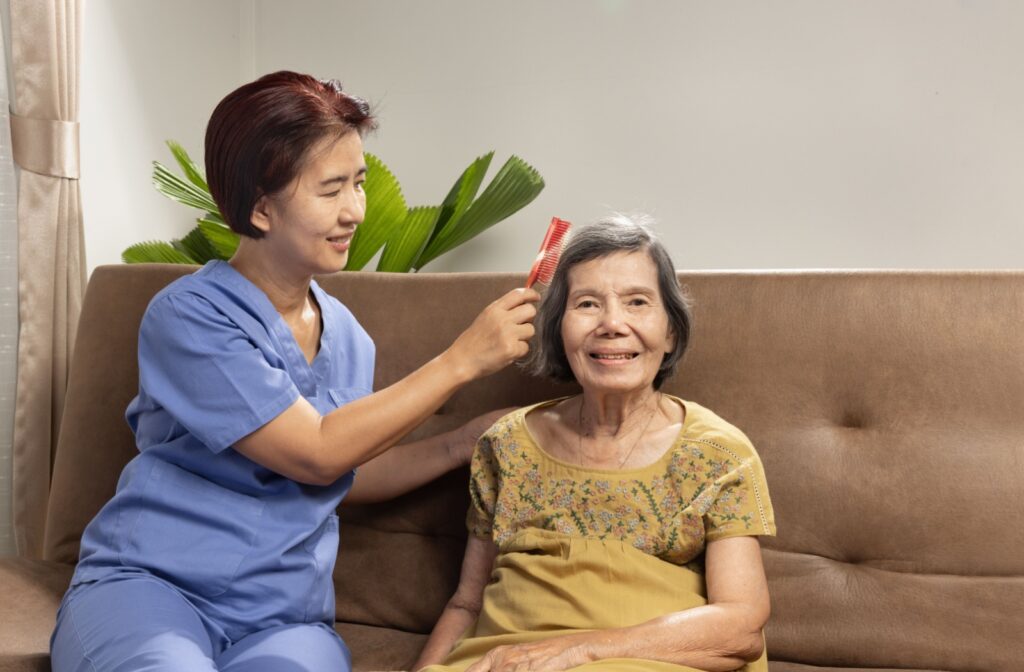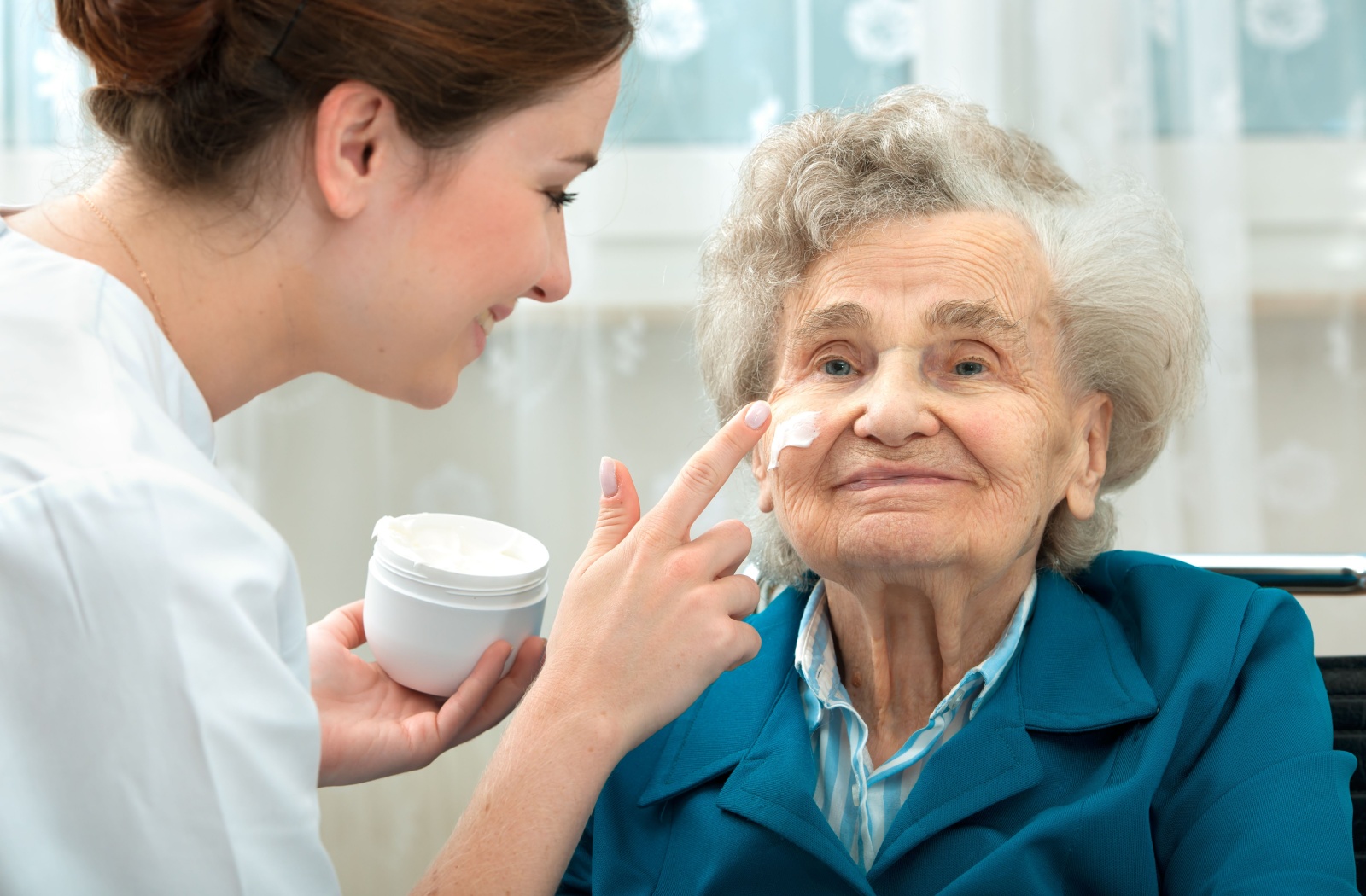Maintaining personal hygiene is a fundamental aspect of good health, yet it can feel overwhelming for many seniors. Helping an aging loved one with personal hygiene and grooming can be a delicate responsibility for family caregivers. Fortunately, assisting your loved one while respecting their dignity and independence can be easily achieved by establishing a routine and prioritizing safety, privacy, and effective communication.
From solid strategies you can implement at home to professional support options available in senior living communities, we’ll guide you through every step for creating a safe, comfortable hygiene routine for your older loved one.
Why Personal Hygiene Is Crucial for Senior Health
Personal hygiene is more than just a daily routine; it’s a key component of overall health and well-being for seniors. Proper hygiene reduces the risk of infections, promotes skin health, and prevents illnesses caused by bacteria, fungi, or viruses.
But the benefits go beyond physical health. Hygiene plays a significant role in mental and emotional well-being. Being clean and well-groomed fosters feelings of self-esteem, dignity, and confidence. Maintaining these small but significant habits can make a big difference for seniors navigating the challenges of aging.
Additionally, a regular hygiene routine allows caregivers to observe changes in their loved one’s skin, mobility, or cognitive abilities. These insights can help identify potential health issues early on, ensuring timely medical intervention.
How to Create a Safe & Comfortable Hygiene Routine
Offering support with hygiene starts with creating an environment where your loved one feels both physically safe and emotionally comfortable. The following tips can help establish a routine that works for both of you.
Establish a Routine
Routine builds familiarity and structure. Aim to establish a consistent schedule for hygiene tasks, including bathing, oral care, and grooming. Whether it’s a morning shower or an evening skincare routine, sticking to a schedule helps build habits and reduces feelings of uncertainty or resistance.
Work with your loved one to create the routine. This could involve asking, “When do you feel most comfortable bathing or showering?” Including them in the decision-making process honors their preferences and increases their cooperation.
Prioritize Safety & Privacy
The bathroom can be one of the most hazardous areas for seniors due to its slippery surfaces. Here’s how you can prioritize safety without compromising privacy:
- Use grab bars and non-slip mats: These provide extra support and prevent falls.
- Install a shower chair: Sitting can make bathing easier and more manageable.
- Ensure appropriate lighting: Bright lighting reduces the chance of tripping over obstacles.
- Consider bathroom modifications: Many senior living apartments feature safety enhancements, such as walk-in tubs and emergency call buttons, for added peace of mind.
At the same time, creating a sense of privacy is essential. Respect their boundaries and offer limited assistance unless they request more help.
Encourage Independence, Provide Assistance
Maintaining independence is crucial, even if your loved one requires additional support. Empower them to handle simple tasks, such as brushing their teeth or washing their face, while you stand by for support. Use adaptive tools, such as long-handled sponges or electric toothbrushes, to make activities more manageable.
Focus on Creating a Relaxing Environment
Hygiene tasks, such as bathing, can be stressful for seniors. Turn these moments into opportunities for relaxation by creating a calming atmosphere:
- Use warm water and maintain a comfortable room temperature.
- Play soothing music to set a relaxing tone.
- Offer gentle, unscented products that won’t irritate sensitive skin.
- Create positive reinforcement by complimenting your loved one on how refreshed they look afterward.
Address Potential Challenges
Some days might be more complex than others. Seniors with dementia or mobility issues may be resistant to hygiene assistance. Fear, embarrassment, or discomfort are common barriers.
Approach these situations with patience and empathy. Offer reassurances such as, “I’m here to help, and we’ll go at your pace.” Tools like hand-held showerheads or sponge baths can offer gentler alternatives to a complete shower on particularly challenging days.
Communicate Effectively
Communication is key to ensuring your loved one feels respected and understood. Use simple, clear language and explain each step as you go. For instance, say, “I’m going to help you wash your hands now; is that okay?”
Watch their body language and emotions to gauge their comfort level. If they look anxious, pause and reassure them before proceeding.
Practical Advice for Helping with Personal Care

When offering hands-on assistance, the following practical tips can make each task more manageable for both of you:
- Oral Hygiene: Use an electric toothbrush for ease, and don’t forget to check for issues like gum sensitivity or dry mouth.
- Skin Care: Help prevent dryness by moisturizing their skin daily. Be on the lookout for pressure sores or rashes.
- Hair Care: Use no-rinse shampoos on days when showering feels overwhelming.
- Nail Hygiene: Trim nails regularly to prevent discomfort and reduce the risk of ingrown nails.
Always approach tasks with gentleness, prioritizing your loved one’s comfort.
How Senior Living Helps with Personal Hygiene & Grooming
If you’re finding it difficult to manage your loved one’s personal hygiene at home, senior living communities can be a tremendous help. Modern senior living apartments are designed with safety and comfort in mind. Grab bars, walk-in showers, and emergency response systems are often included to minimize risks.
But beyond the physical environment, professional caregivers within these communities are trained to provide dignified assistance. Their goal is to help residents maintain independence while offering support as needed. Whether it’s help with bathing, dressing, or grooming, they approach these tasks with sensitivity and professionalism.
Additionally, these communities foster a sense of belonging and community among residents. This can motivate seniors to take pride in their appearance and actively participate in group activities, ultimately improving their well-being.
Support Your Loved One with Confidence
If you want additional support with personal hygiene, All American Assisted Living at Warwick provides experienced care teams and thoughtfully designed apartments. With the right tools and support, your loved one can experience improved health, confidence, and overall quality of life. Contact us today to discover how our community can support your family.



